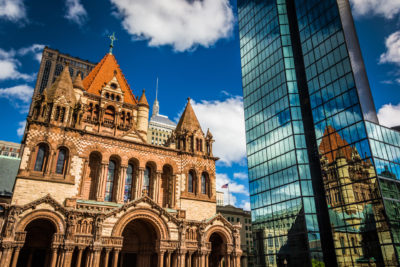 Getting ready for “REVOLUTION & REFORM”? Boston is a beautiful place to be in autumn, always brimming with reflections of the past. Here’s a quick roundup of some public history sites for you to explore between panels. Bring on your suggestions for favorite spots in the comments below! And be sure to check out our #USIH2020 CFP due April 15.
Getting ready for “REVOLUTION & REFORM”? Boston is a beautiful place to be in autumn, always brimming with reflections of the past. Here’s a quick roundup of some public history sites for you to explore between panels. Bring on your suggestions for favorite spots in the comments below! And be sure to check out our #USIH2020 CFP due April 15.
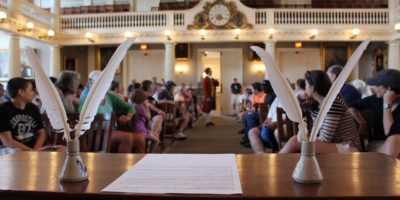 Faneuil Hall: Built in the 1740s, this was the site of many of the political debates that resulted in the American Revolution. James Otis, Samuel Adams, and others protested taxes as well as posited ideas of republicanism, independence, and self-rule. A century later, a number of black elected officials, including Julius Caesar Chappell, delivered impassioned speeches in favor of racial equality. The site is now one of the most popular tourist destinations in America.
Faneuil Hall: Built in the 1740s, this was the site of many of the political debates that resulted in the American Revolution. James Otis, Samuel Adams, and others protested taxes as well as posited ideas of republicanism, independence, and self-rule. A century later, a number of black elected officials, including Julius Caesar Chappell, delivered impassioned speeches in favor of racial equality. The site is now one of the most popular tourist destinations in America.
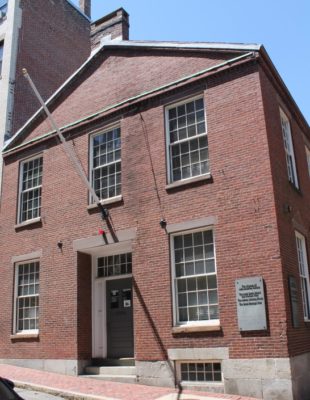 African Meeting House: Located in one of the historically black neighborhoods of Boston, this meeting house featured some of the most famous abolitionists during the nineteenth century. Frederick Douglass, Sarah Grimké, and William Loyd Garrison spoke from its pulpit. The building also served as a public school for the city’s black children. Built in 1806, the meeting house is the oldest existing black chapel in America. (Make sure to also check out the Museum of African American History, which is next door.)
African Meeting House: Located in one of the historically black neighborhoods of Boston, this meeting house featured some of the most famous abolitionists during the nineteenth century. Frederick Douglass, Sarah Grimké, and William Loyd Garrison spoke from its pulpit. The building also served as a public school for the city’s black children. Built in 1806, the meeting house is the oldest existing black chapel in America. (Make sure to also check out the Museum of African American History, which is next door.)
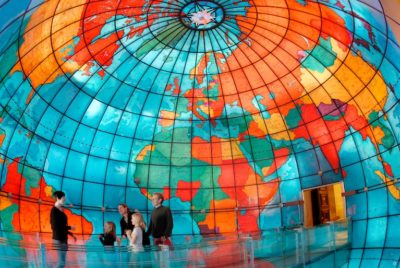 Mary Baker Eddy Library: Mary Baker Eddy, the founder of Christian Science, is one of the most influential religious visionaries in America. This eleven-story building was originally meant for the denomination’s Publishing Society. Later, it became an impressive library and archive to hold, among many other collections, Eddy’s manuscripts. Make sure to visit the mapparium, a three-story stained-glass exhibit of the world, reflecting the faith’s global ambitions.
Mary Baker Eddy Library: Mary Baker Eddy, the founder of Christian Science, is one of the most influential religious visionaries in America. This eleven-story building was originally meant for the denomination’s Publishing Society. Later, it became an impressive library and archive to hold, among many other collections, Eddy’s manuscripts. Make sure to visit the mapparium, a three-story stained-glass exhibit of the world, reflecting the faith’s global ambitions.
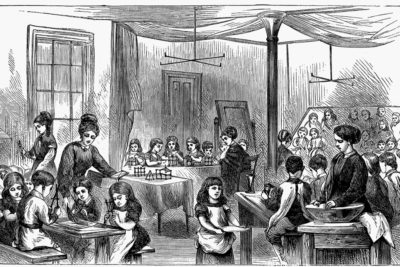
Elizabeth Peabody’s West Street Bookstore: Located at 15 West Street, this is the site where Peabody became America’s first woman publisher. Her Foreign Lending Library, which featured the most provocative works from Europe, served as the center for one of the nation’s most influential intellectual movements, the transcendentalists. Peabody served as the printer of the group’s periodical, The Dial, as well as a later magazine, Aesthetic Papers, that included the first appearance of Henry David Thoreau’s “Civil Disobedience.” The original structure is no longer available, but a new(er) bookstore, Brattle Book Shop, is nearby.
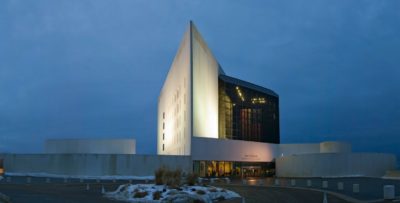 John F. Kennedy Presidential Library and Museum: Conveniently accessible via the MBTA Red Line, the museum is not only a useful overview of one of the twentieth century’s biggest cultural icons, but also of his era. The building’s striking design reflects the decades-long project’s ambitions. Schedule a research trip, or visit its new special exhibit on the Freedom 7 Space Capsul.
John F. Kennedy Presidential Library and Museum: Conveniently accessible via the MBTA Red Line, the museum is not only a useful overview of one of the twentieth century’s biggest cultural icons, but also of his era. The building’s striking design reflects the decades-long project’s ambitions. Schedule a research trip, or visit its new special exhibit on the Freedom 7 Space Capsul.

0